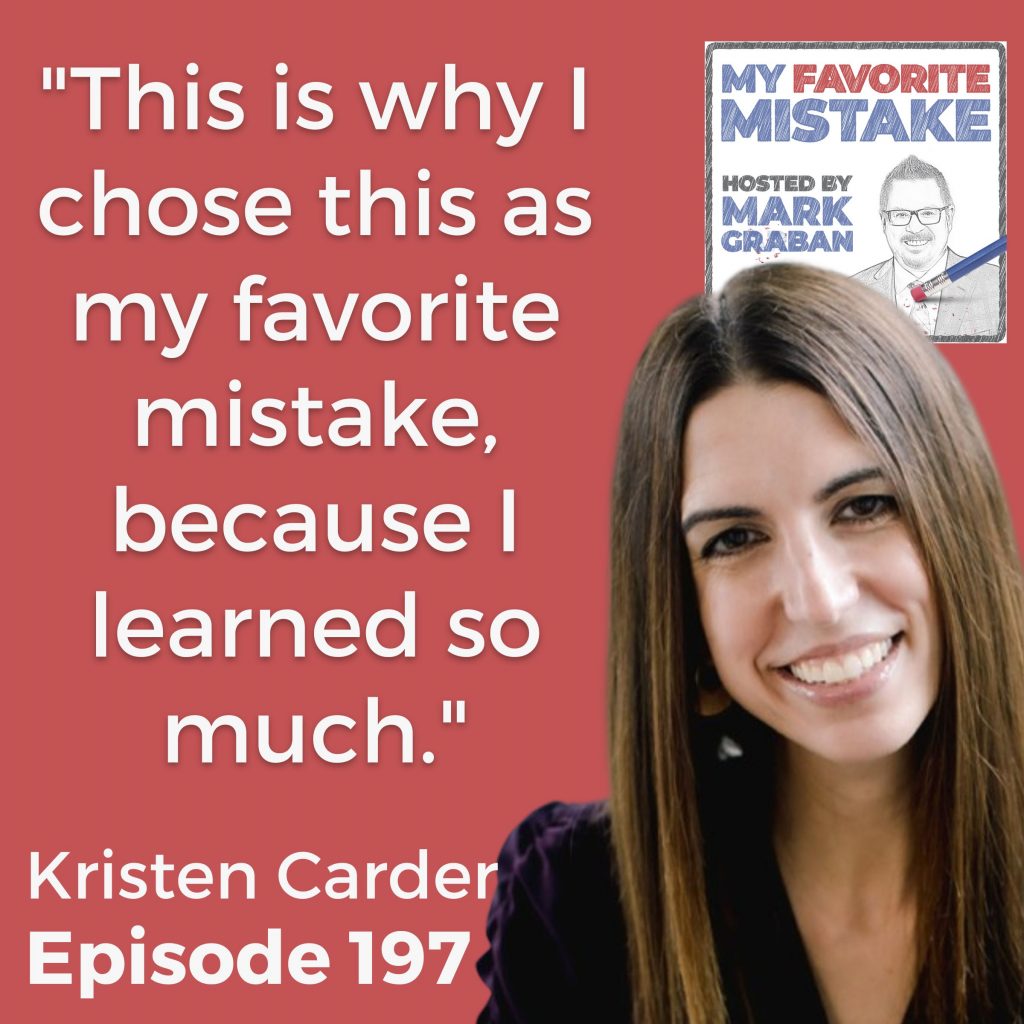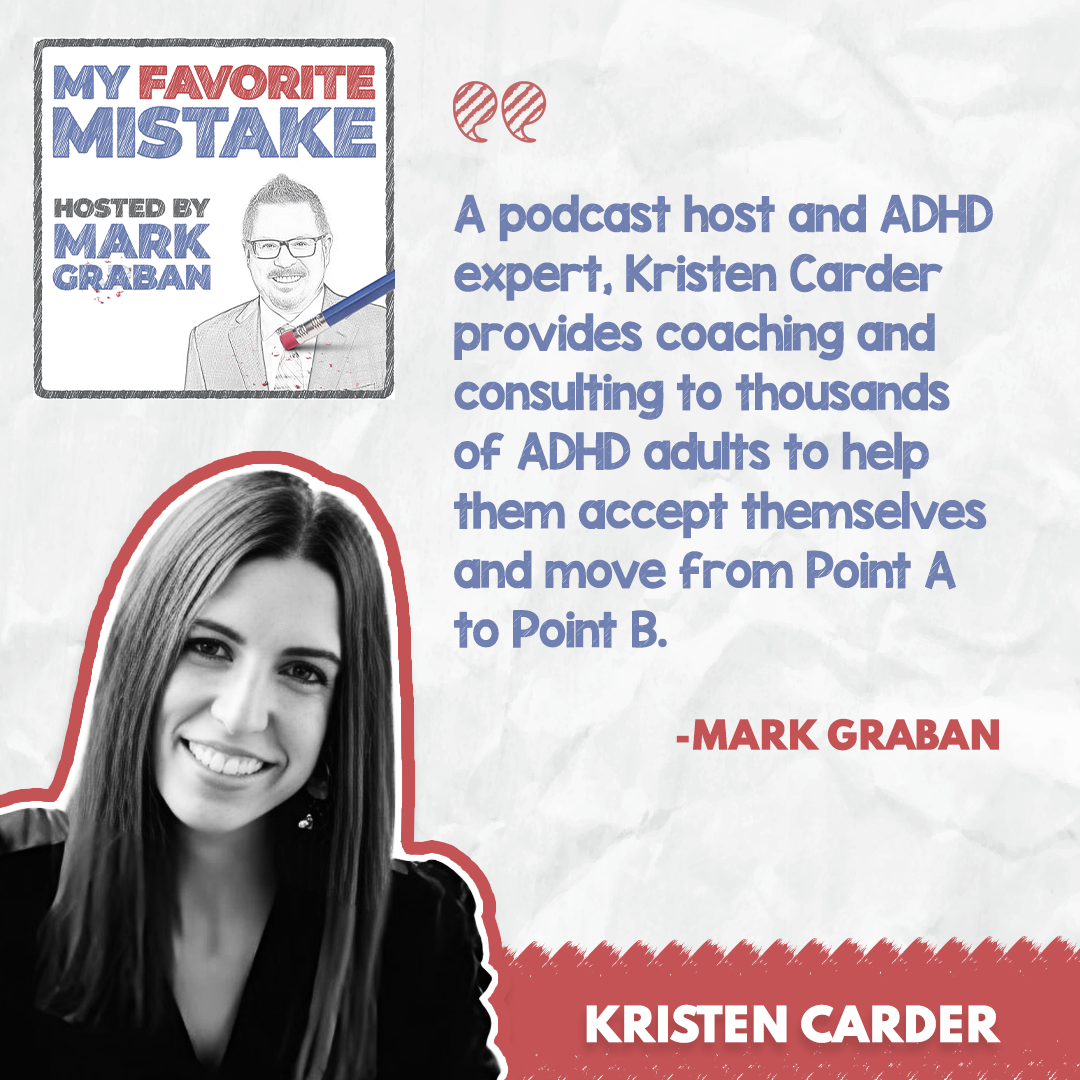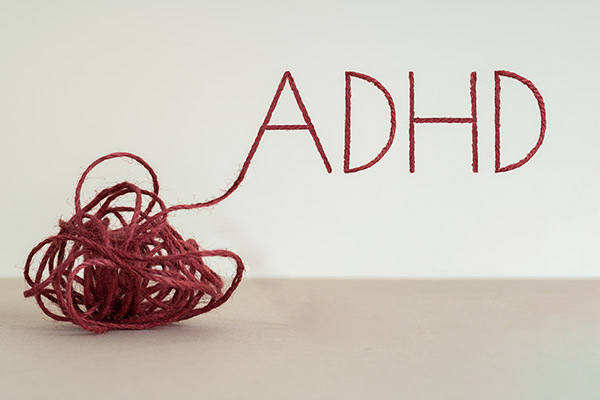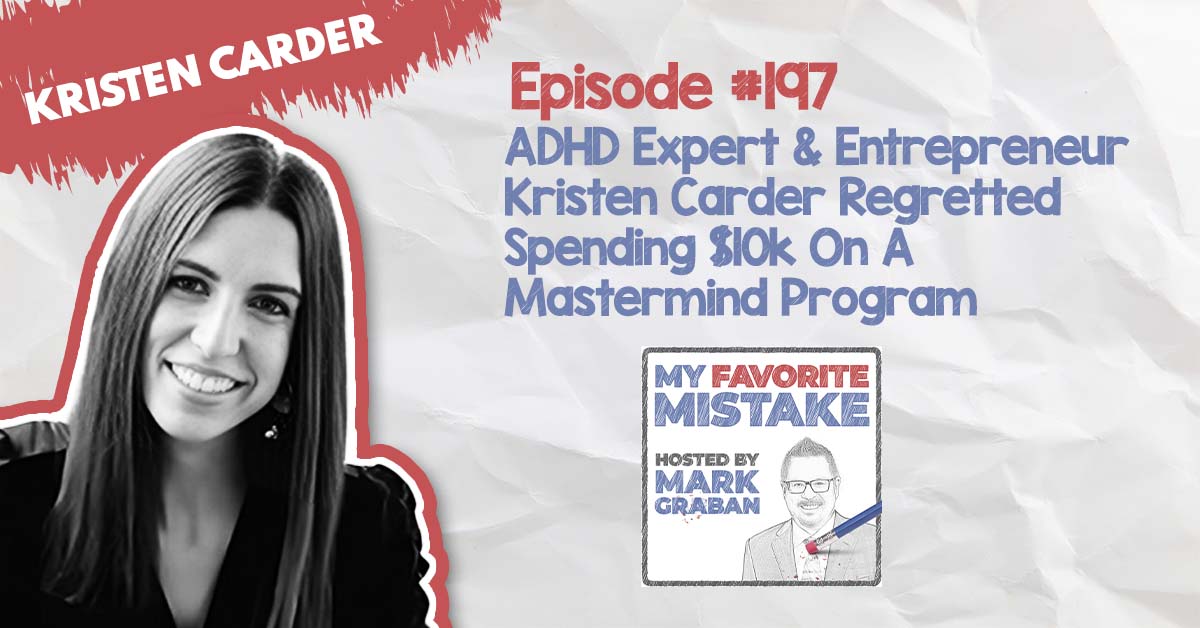Listen:
Check out all episodes on the My Favorite Mistake main page.
My guest for Episode #197 of the My Favorite Mistake podcast is Kristen Carder. She is a serial entrepreneur and mindset coach for adults with ADHD. She's the host of a podcast “I Have ADHD.”
In this episode, Kristen tells her favorite mistake story about spending $10,000 on a “mastermind” group that was not at all what she expected. Why was there a gap between her expectations and reality? When did she realize there was a problem? What did she do and how did she learn from this, as a coachee and a coach? We also talk about mistakes related to understanding ADHD and living with it — at work and in our personal lives.
As she always says on her podcast, she's “medicated, caffeinated, and ready to roll.”

Questions and Topics:
- When did you realize it was a mistake? Did you ask for a refund? 3 reasons why not…
- When should somebody join a “mastermind” instead of getting 1×1 coaching?
- Lesson learned: explicitly lays out WHAT a mastermind is when she sells one
- Red flags that you’re getting bad info about ADHD?
- Why ADHD is not simply a “gift” or a “superpower”?
- How do you define ADHD?
- The inability to direct attention
- Trouble regulating impulse – attention and emotion?
- You were diagnosed in college… I was diagnosed last year at age 48… what led to you getting diagnosed?
- Causes? Differences in the brain?
- A mistake to tell people at work that you’re ADHD?
- Kristen's episode: Should You Tell People About Your ADHD?
- Explanation not an excuse
- Her FOCUSED coaching program
Find Kristen and Her Podcast on Social Media:
Watch the Full Episode:
Quotes
!["What I usually do [now] is I only buy from people who have helped me for free." - Kristen Carder](https://www.markgraban.com/wp-content/uploads/2023/01/Kristen-Carder-My-Favorite-Mistake-1-1024x1024.jpg)

![Kristen Carder "If your reason for sharing [your ADHD diagnosis] is to build connection and community with your colleagues, the question that I would first ask is, 'Do my colleagues have the capacity? Have they shown a history of being able to honor what I say, validate my experience, and hold space for the nuances of my life?'" Kristen Carder](https://www.markgraban.com/wp-content/uploads/2023/01/Kristen-Carder-My-Favorite-Mistake-3-1024x1024.jpg)
Subscribe, Follow, Support, Rate, and Review!
Please follow, rate, and review via Apple Podcasts or Podchaser or your favorite app — that helps others find this content and you'll be sure to get future episodes as they are released weekly. You can also become a financial supporter of the show through Anchor.fm.
You can now sign up to get new episodes via email, to make sure you don't miss an episode.
This podcast is part of the Lean Communicators network.

Other Ways to Subscribe or Follow — Apps & Email
ADHD Expert & Entrepreneur Kristen Carder Regretted Spending $10k On A Mastermind Program

Here's Episode 197. We have Kristen Carder, host of the I Have ADHD podcast. She is a serial entrepreneur and a mindset coach for adults with ADHD, which is why I invited her here. I have listened to many episodes of her podcast, and it is called I Have ADHD since I got diagnosed for having ADHD. Thank you for being here. How are you?
Mark, thanks for having me. I am well, thanks.
At the beginning of all your episodes, you always announce three things. I didn't know if that was going to be your answer to how you are doing.
Medicated, caffeinated, ready to roll.
As I started trying to dive deep and learn about ADHD, your podcasts have been informative, and it is good information, sources, and people you cite. All the information and the way you share about yourself and your ADHD journey have been helpful and inspiring for me. Thank you for that.
Thank you for saying that. I'm glad to hear that.
We will delve into that topic later on here. I don't know if your story is related to ADHD or not, but the different things you have done in your career, Kristin, what would you say is your favorite mistake?
It was such an interesting process to think through, which would be my favorite mistake because, as a human, we are all making mistakes constantly. As a human with ADHD, there is no lack of mistakes in my life. My favorite mistake was that several years ago, I joined a mastermind. I'm going to use that term loosely. It was a mastermind. I made an investment in this program. It was a $10,000 investment, which is not small. It turned out to be not at all what I thought it was going to be. It did not help me in the ways I thought it would.
I joined because I was desperate for help, community, and connection. For those of you who don't, I run a large coaching membership, and there aren't a lot of people running memberships. I wanted to get into a mastermind where there was a community of people who were running memberships. I thought, “If I could get into this mastermind, this is going to solve everything. This is going to be the thing. I'm not going to be lonely anymore. I'm not going to feel directionless. I'm going to have the support I need.”
I fill out an application and pay my $10,000. I get into the mastermind and find out there are 100 people in this “mastermind.” For those of you who are not in the coaching world, masterminds are 10 to 20 people. That’s a true mastermind. I went in with a lot of assumptions. I assumed it would be smaller and I would have access to the coach, which I did not. The coach showed up once a month on Facebook Live Q&A for $10,000.
The one part that was true to what I thought it was going to be was that there was a sense of community. The problem is that it was on Facebook. For anyone with ADHD, social media is a rabbit hole. I would go on during my workday because this was a work task and try to get information or connect with the community.
I would inevitably be distracted, go down the Facebook rabbit hole, and not be able to get back on board with my work. That was a big mistake. I wish I had gathered more information upfront and hadn't made assumptions. I wish I did not trust other people to run programs the way I run them but do my due diligence. I did not do that. I learned a lot, but that was $10,000 right down the drain. That is how I look at it. It is gone.
It doesn't put the $10,000 back to say you are not the only one who has come on this show and shared a similar mistake. We can get ourselves in trouble. Our mistakes are often born out of assumptions that turn out not to be true or lack of information that is filled in by assumptions. To what extent did they oversell it versus you just assuming a different reality?
I would put this as another layer of the mistake. What I tell my clients and do is I only buy from people who have helped me for free. A good way to make an investment is if someone can help you for free, it is usually safe to invest because, most of the time, their paid content will be even more helpful. That did not happen with this person. I did not even take the time to let him help me for free. I was like, “I want it now. Let's go.” I was in a place where I thought the answers were outside of me, and I needed to find someone else who had the answers.
[bctt tweet=”What I usually do is I only buy from people who have helped me for free.” via=”no”]
That is common for humans, especially humans wanting to reach big goals, who are doing it for the first time. I was like, “This is my first time navigating this territory. Someone else knows how to do this. I'm not the one who knows. I need to find that person. Here is someone successful. They help people with memberships. I will make sure I get into their sphere. I will give them my money so they can solve my problems for me,” rather than believing, like, “I know what I'm doing. I have the capacity to answer these questions for myself. I just need to lean on what I already know about my clients, business, and myself.”
I appreciate you sharing the story and those reflections around that. It is tough when we have a moment of realizing, “Did I make a mistake?” It almost sounded like it happened early in membership. Did you explore? Can you get out of this? Could you get a refund? What happened to try to process at the moment was a mistake?
In the first month, as I began to explore the materials, there were a lot of training videos in a membership portal. I am all about training videos. My membership has that as well, but they were lacking in substance. I would click through the videos and be like, “I already know this crap.” It is not solving any of my immediate pain points. After we had our first Q&A, I was like, “What? This is it?” My members within my Focused Program, I'm there three hours a week. That is different from one hour a month of a Q&A. I could not compute. I was like, “Where's the rest of it?” That is how I felt.
In that first month, I was like, “I think I made a mistake.” I was not thinking of asking for a refund for three reasons. 1) I had the money to invest. I wasn't investing from a place of lack. I had a budget for it. I put that money toward the “wrong thing.” 2) It is hard to be a company owner and get requests for refunds. I'm in that position. I know that is difficult. I was maybe taking a little too much responsibility for the way they would feel.
I was like, “I have the money. It was my mistake. I don't need to request a refund.” I wasn't confident enough, or I felt it was my fault. I didn't do my due diligence. I didn't want to put that on them. I was like, “This is my fault.” I wasn't even in a sales funnel for them. I went out, found them, and said, “You can solve my problem,” and then I got in. If I felt like they oversold it, I probably would have.
You might have had a spidey sense if it was a hard sell or oversold. It could be a turn-off. Do you have advice for others? As you think through, for people who maybe haven't tried a mastermind-type format, are there certain situations where one-on-one coaching is the only way to go versus being part of a group? Do you have thoughts on that?
This is why I chose this as my favorite mistake because I learned so much. I learned people need to be taught what a mastermind is. You can't call something a mastermind without defining it. What does that mean? It is such a buzzword. The coaching industry is not regulated. We are all making crap up. It is important to know and understand that if you are considering investing in a coaching program, a membership, or a mastermind, you need to have that person specifically define the terms for you.
[bctt tweet=”This is why I chose this as my favorite mistake, because I learned so much.” via=”no”]
I sold a mastermind, and I explicitly laid everything out, “No more than ten people. We will meet three times a month with me. I will be there for an hour three times a month, and you will meet one time a month as a mastermind group of peers without me.” Defining those terms is what I consider to be a mastermind. That would work well for the ADHD brain.
I would, for sure, say, “Get everything clearly defined.” I do think the number of people inside of it matters. If it is more than 25 people and many expert leaders in the coaching industry, that is not a mastermind. That is a group coaching program, which is fine. That is a good thing. It is just a different product. My third thing would be to make sure the person helps you for free before you ever pay them a cent. You have to make sure that someone has the ability to change your life for free. If they can do that, they are worth investing in.

I'm going to make the pitch for your podcast. You and your podcast have helped me greatly for free. It is called Focused. I like to ask you a little bit more about it at the end, but related to your story, I appreciate what you said about learning so much. It seems like applying some of those lessons to your own business and the people you are serving.
One thing that I would like to add is I made an intentional decision about three months into the mastermind to not put any more of my time or effort into it. It was a year-long program. I thoughtfully made the decision, “I'm not giving my time to this anymore.” That was hard to do because of sunk cost fallacy. I put money into this. I put quite a bit of time into trying to get as much out of it as possible. If I choose not to continue with it, it is solidifying this was a straight-up fail.
That was a hard decision, but I did a cost-benefit analysis. I would pay $10,000 to get out of this to never have to think about it again, not have to feel bad about this again, and get rid of this on my calendar. I pay money to get out of it. That is important to notice. That was the period of time when I was able to forgive myself. I’m like, “This was a mistake, and it sucked.” There are losses, like money loss, time loss, and pride loss. I live in the reality that it is better for me to let this go and move forward without it. That was an important part of the journey.
There are many good lessons there. That goes back to the economics terms of the opportunity cost of your time and mental energy is one thing, but you talk about forgiving yourself or showing yourself some grace. One thing we try to celebrate here is we all make mistakes. We try to find a balance of reflecting without beating ourselves up. It's maybe easier said than done sometimes, but at some point, you have to process it and move on.
Do a quick cost-benefit analysis like, “What is it going to cost me to keep going with this? What are the actual benefits I'm getting out?” When you can look at it from that perspective, a lot of us would let go and move forward.
I hope readers now are doing their own cost-benefit analysis that they will continue reading. They are getting a lot out of what you are saying here. Kristen, thank you for telling that story. There are a lot of questions related to ADHD. As you lay out on your website, you have been studying this for a long time. It is helpful when someone lays out, “Here are my teachers and influencers.” That comes through in what you share on the show. This is not just your ideas you are sharing.
This is a question to ask you. I'm not asking you to name names or trash another podcaster, but there are some podcasts where you feel like this seems well-informed versus another idea where you are like, “This is one person's opinion.” You are sharing your experiences, thoughts, and opinions, but it seems well-informed. What would be mistaken information? If somebody is researching or learning about ADHD, what is something that, if you heard it being said, that would give you pause and say, “I don't know if this is a good source?”
I love it when people are willing to cite their sources. I try to do that a lot with the podcast, which is funny because I'm popping in references to scholarly articles from the NBHI, the National Institute of Behavioral Health. Citing sources is important. There are certain things when people say them, it does give me pause. For example, if someone is talking about the gift of having ADHD, like, “ADHD is a gift, and ADHD is a superpower,” I stop and think, “Do they understand the brevity of this diagnosis? Do they understand the depth? Have they done enough reading, research, and studying to understand that untreated ADHD can lead to many devastating side effects, including shortened life expectancy?”
I know that there are people that want to put a positive spin. I don't think we need a positive spin. People who are grounded in reality can look at something like an ADHD diagnosis and know that it is something to be taken seriously, but also that we can truly thrive and reach our potential beyond that diagnosis. My biggest red flag is when someone approaches the conversation about ADHD as a gift or as a superpower. My radar is going off because it shows me that they haven't done a lot of research and reading. Other than Ned Hallowell, no ADHD expert ever says it is a gift.
When you look across the board of psychologists and psychiatrists, nobody is saying it is a gift. Those who are doing the research and are in the trenches of diagnosing and treating the disorder, none of them are saying it is a gift. When Dr. Hallowell was on my podcast, I respectfully and kindly confronted him, like, “You say it is a gift. How can you say that?” What he graciously explained was, “When it's treated, properly diagnosed, and taken care of, there are many gifts to be found in the person with ADHD.” I was like, “Yes, hallelujah.” I cosigned. That would probably be the number one thing.
We jumped into it, and a lot of people don't know. One area where you were helpful for me is coming up with a definition of ADHD. I should have asked that before diving into some of the details, and you do it succinctly. Kristen, what is ADHD?
I'm going to read from my notes because part of having ADHD is having poor working memory, which means those beautiful phrases do not stay in our brains for long. ADHD stands for Attention Deficit Hyperactivity Disorder, which is a terrible name for it because we do not have a deficit of attention. What we have is an inability to regulate our attention. ADHD is a disorder of regulation. We struggle to regulate our attention, behavior, and emotions. That is the most concise, succinct definition. We struggle to regulate attention, behavior, and emotions. We have as much attention. It is usually on the wrong thing.

That phrase has stuck with me, that beautiful phrase of the inability to direct attention. One thing I have learned is I finally came to grips with ADHD being something to take seriously that was causing problems, not like rock bottom, losing jobs, losing relationships, or crashing cars every 60 days. Some symptoms or manifestations of ADHD are not at the extreme end of things. I realized it was causing problems. One of those is attention. I have learned the difference between not wanting to pay attention and not being able to pay attention.
As I have learned, even with medication, it does not make boring stuff interesting, but the problems that were manifesting both professionally and personally were wanting to pay attention and struggling with, “Why can't I? Why am I driven to do something else now?” It was hurting professional relationships to some degree. I have apologized to a lot of people. There were times when I felt like I wasn't giving attention. I was losing out. It may have come across as disrespectful to them.
That is something that has been easier. I wouldn't say easy, solved, or fixed. It is like the ADHD brain says, “That is interesting now. That is something I need and want to do now.” There was that piece of it. That was an eye-opener for me, and this was that bad social media habit. I got something good out of mindlessly scrolling through Twitter.
I found an article about ADHD and emotional regulation. I feel like ADHD attention deficit is the inability to regulate attention. It is the same part of the brain that makes it hard to regulate emotional responses to things. It was similar to like, “I want to be paying attention, but I feel like I can't.” There would be that moment of, “I'm firing off an angry email. I shouldn't be doing this.” This is about that compulsion, and it is embarrassing to admit. Who likes to admit a lack of self-control?
When that article and that eye-opener about, “This is not about attention,” the emotional regulation piece is as much a thing to work on for me. That was one discovery and the mistake of not knowing that and the mistake of not taking ADHD seriously enough. I made the mistake of thinking I could make an effort on my way out of it. I just needed to care more and try harder. That didn't work.
I would love to reframe a little bit of what you are saying because you are taking those on as your mistakes. However, the one you mentioned, “I thought I could effort my way out of it,” I believe that we are taught as kids and adolescents in school that we are smart, but we lack motivation and effort, and we just need to try harder. Maybe that wasn't your mistake. That was teachers, parents, coaches, and other people saying to you, “Mark, you are smart. What is going on here? You need to try harder. You need to do better.” We take that on as our own self-talk and thoughts.
How in the world would you have known that emotional regulation was a part of ADHD? Nobody hands you a pamphlet when you are diagnosed with ADHD. They should. I should make pamphlets. I should send them. That is a brilliant idea. Everyone who is diagnosed with ADHD should be told, “This is not a deficit of attention. You are going to have a hard time regulating your attention, behaviors, and emotions.” These are things we should be told, but we are not told. It takes scrolling through Twitter, coming across an article, and saying, “I never knew.” That is an ADHD industry mistake. Not your mistake.
I have been trying to find the balance of realizing there are things I can work on without shaming. I make myself feel bad for not paying attention and reaching out. The best thing I did was reach out to a counselor, saying, “I need to talk about these things.” I had a copy of Ned Hallowell's Driven To Distraction on my bookshelf for many years, and I never read it, and I forgot how it got there. I have been in denial about this for so long.
Let me bring it back to you and your story a little bit, Kristen. You were diagnosed in college, but not everybody gets diagnosed as a child. I got through college. We find ways of masking or compensating. Tell us your story of what led you to either ask questions about this or somebody saying, “Kristen, you have ADHD.”
Ironically, my answer goes back to Ned Hallowell's book Driven To Distractions. My dad read that when he was in his 40s. I was in my teens. He was subsequently diagnosed with ADHD. He started to nag me about it. When you are a teenager, your dad doesn't know anything. I’m like, “Whatever, dad.” It wasn't until I was in college. I was double majoring. I was drowning. I was getting A's and Fs and not much in between. I was depressed and suffering from disordered eating. I had high anxiety. It was not good.
I finally called my mom and said, “Dad has been talking to me about ADHD. I'm ready to see if that is what this is.” It was a brief evaluation. It was the dude that diagnosed my dad. He already had it in my mind that I had it. Luckily, I am. I have ADHD, but it wasn't a legit evaluation. He was like, “Yes, you meet the criteria.” He gave me medication. The medication was helpful. It is what I needed to snap me out of the pit I was in. The next semester my grades went on the fridge. It was amazing. Pills don't teach skills. I was still low functioning, but at least I wasn't suffering the way I was. Several years later, I was diagnosed again by a psychiatrist. It was a confirmation of the diagnosis.
It is tough because it seems like what I went through and others have gone through is based on surveys, behaviors, and how certain things are happening. There are no brain scans or blood tests. It is a difference in the brain, but it is not easily diagnosed as it runs you through an MRI. We see the ADHD there.
Dr. Amen does a lot of work with fMRI imaging, and he does scans. I'm not sure, but there is a little drama in the industry because it seems to me that Dr. Amen is an outlier, and there is the group of psychologists and psychiatrists who are the in-crowd, and there is Dr. Amen, who is in the out-crowd. I wish I could sit down with these dudes and be like, “Tell me, what is the tea? Give me the scoop.” I do know that he does do certain brain scans. The frontal lobe will likely look a little bit different. What is hard is, does it look different because of ADHD? Does it look different because of developmental trauma? There could be a number of factors.
If there were a blood test that showed this genetic mutation, that would be convenient, but we don't have that. It is gathering threads from your life of behaviors and mistakes. I can sniff it out in 30 seconds when somebody comes to me and start a conversation and talk about their life pattern. I'm like, “I know that I cannot clinically diagnose you, but please get evaluated for ADHD.” We all have similar stories.
This has been helpful and interesting. We are scratching the surface. I would recommend people go check out Kristen's podcast. It is incredibly helpful. One other phrase you use is a neurodevelopmental disorder, which is different than saying a “disease.” Would you lump it into “mental health?”
Not everyone loves the term disorder. I love having that conversation because we could have beautiful sparring with people who see the word disorder as being negative and people who see the word disorder as being validating, freeing, and helpful. My perception is that both perspectives are perfect. If you don't love the word disorder, use the word neurodevelopmental condition. That works. If the word disorder is validating, freeing, and helpful for you, use it. It is great.
Neurodevelopmental refers that it is in the brain, and it is a developmental disorder, meaning it has impaired the way you develop. Here are some fun facts about ADHD. People with ADHD are about 30% behind developmentally. That means that while the neurotypical brain might be fully formed at age 22 to 25, ADHD is not going to land until they are in their 30s. It is rare that an ADHD will have a fully formed brain until they are in their 30s.

When I think about myself at the age of eighteen making career decisions, I thought a Music degree would be a great way to go. I was eighteen years old, but I was functioning at about age fourteen. We don't let fourteen-year-olds make decisions like that. Knowing I was developmentally behind or delayed is helpful for me to go back and forgive myself for getting a Music Performance degree.
Was it instrument or vocal?
Vocal, and I minored in piano.
Here's one other question I want to squeeze in before asking a little bit about Focused and the program there. When might it be helpful or a mistake to tell people you work with about an ADHD diagnosis?
I have a podcast episode on this. It is called Should You Tell People About Your ADHD? First of all, I don't know. It is going to differ for every human. At least here in America, ADHD is covered under the Americans With Disabilities Act. Depending on the severity of your ADHD, you may be able to get accommodations at work.
If that is your reason for sharing that you would like to get accommodations, it is a good reason to share. If your reason for sharing is to make an excuse so you don't have to be held accountable, it is not a great reason for sharing. These are Kristen Carder's opinions. If your reason for sharing is to build connection and community with your colleagues, the question I would first ask yourself is, “Do my colleagues have the capacity? Have they shown a history of being able to honor what I say, validate my experience and hold space for the nuances of my life?” That goes with anybody you are thinking about telling. This is nobody's business. Nobody needs to know.
[bctt tweet=”If your reason for sharing is to build connection and community with your colleagues, the question I would ask is, “Do my colleagues have the capacity? Have they shown a history of being able to honor what I say, validate my experience, and hold space for the nuances of my life?”” via=”no”]
I'm open with my diagnosis. It is my life's work, but that is not true for everyone. What I always say is, “This is nobody's business. You don't have to tell a soul if you don't want to.” If you choose to tell, make sure you are telling people who have a history of being validating, understanding, kind, and open. If you want to tell your mom, but your mom has a history of dismissing mental health, maybe you tell her, but you expect to be dismissed.
It is like, “I want to tell her because I want her to have this information, but I know she's going to dismiss me, and I'm willing to tolerate that.” It is a nuanced conversation, but understanding why you want to tell someone is important. At work, if it is like, “I need accommodations. I know that I deserve them because it is covered under the Americans With Disabilities Act,” that is a perfect reason to tell.
That was good advice, especially thinking of the situational element of who you are telling. Another phrase I picked up from your podcast is, “It is an explanation, not an excuse.” I have said that 300 times in the last several months because that captures it.
It is important that we first understand that for ourselves and then help our loved ones understand that. When my husband texts me like, “Can you stop for milk anywhere at home?” I'm like, “Sure.” I don't stop for milk on my way home because I have poor working memory. I can't hold the things in my brain. I don't just say, “ADHD,” and go about my business. I say, “I'm sorry. I should have put a reminder on my phone because I know I don't have a good working memory. I will pick up the milk now.” It is a different type of conversation, but it is a good explanation. We have to take responsibility ourselves for that and say, “This does explain it. What am I going to do?”
That was a perfect segue for our final question here as much time as you have to talk about Focused, the program that you have goes beyond medication to think about what strategies and things we can and should be doing. Tell us a little bit more about that program.
It is the joy of my life. Focused is a group coaching program where ADHD adults from around the world gather for community, support, and coaching. I, as the coach, lead coaching sessions. I teach strategy classes. However, I am not a tips and tricks person. In my opinion, tips and tricks are all googleable, and you shouldn't pay me for tips and tricks that you can google.
What I teach in my coaching program is how to accept yourself and your ADHD, how to let go of shame and regret from past mistakes, how to be persistent in going after your goals, even when it is hard, not exciting, and you don't want to do it anymore, and how to engage with your finances even though you feel like you have made millions of mistakes.

I don't do accountability coaching, which is like, “Let's break it down, make a plan, and I will hold you accountable.” What I practice is causal coaching, which is, “Let's get to the root cause of why you are not doing that thing you know you want to do. Why aren't you doing it? Let's figure it out. Let me coach you on all of that drama so you can hold yourself accountable because you are smart and know what to do.”
Nobody comes into Focused being like, “I don't know what to do.” Everyone knows what to do. They are just pissed that they can't make themselves do it. They were like, “Why can't I make myself do the thing I know I should be doing?” That is where an expert coach comes in and helps you to decipher and determine, “Let's uncover and unpack why you aren't doing it.” Spoiler alert, most of the time, it is an emotion, shame, regret, defeat, self-judgment, or self-loathing. It is one of those emotions we have never been taught how to feel and process.
A big part of our working together is me holding up a mirror and saying, “Here is what is going on,” so you can see that reflected back to you and teaching you how to process your emotions, which we are all deficient in. Every single ADHDer is deficient in recognizing, naming, processing, soothing, and regulating emotions. I have a whole course on that. The crux of the program is that because our emotions fuel our actions. If we are not taking action we know we should be taking, we need to look at the emotion and say, “What am I feeling? What am I not willing to feel?”
The website spells out clearly what it is and what it is about. I hope people will go check out IHaveADHD.com. We have been joined here by Kristen Carder. Her podcast is I Have ADHD. I have listened to your voice for many hours and have never been able to interact with you. The next time I'm listening to you to an episode, I'm going to have to try not to jump in and ask you a question. Kristen, thank you for all of that. Thank you for giving your time, story, and insights here.
It was my pleasure, Mark. It has been fun for me too. I'm glad we got to meet.
Thanks again to Kristen Carder. I want to thank you for reading. I hope this show inspires you to reflect on your own mistakes and how you can learn from them or turn them into positive. I have had readers tell me they started being more open and honest about mistakes in their work. They are trying to create a workplace culture where it is safe to speak up about problems because that leads to more improvement and better business results. If you have feedback or a story to share, you can email me at MyFavoriteMistakePodcast@gmail.com. Our website is MyFavoriteMistakePodcast.com.
Important Links
- I Have ADHD
- Focused Program
- Driven To Distraction
- Should You Tell People About Your ADHD? – I Have ADHD Podcast Episode
- MyFavoriteMistakePodcast@gmail.com
- LinkedIn – Kristen Carder
- Facebook – I Have ADHD Podcast & Coaching
- Instagram – I Have ADHD Podcast & Coaching
- YouTube – I Have ADHD Podcast & Coaching
- I WANT TO WRITE MY BOOK
- https://www.MarkGraban.com/subscribe-to-my-favorite-mistake/
- Apple Podcasts – My Favorite Mistake Podcast
- Podchaser – My Favorite Mistake Podcast
- Become a financial supporter of the show through Anchor.fm
- Sign up to get new episodes via email
- Lean Communicators Network
- https://Anchor.fm/favorite-mistake/support

